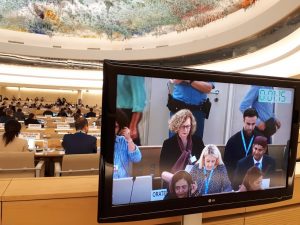UPR OUTCOMES ON RUSSIAN FEDERATION
THE EUROPEAN COURT OF HUMAN RIGHTS INVALIDATES APPLICATION OF THE RUSSIAN LAW ON EXTREMISM TO PEACEFUL RELIGIOUS GROUPS
 CAP Liberté de Conscience, a French NGO created in 2000 dedicated to the respect of the Right of Freedom of Religion and Belief. CAP LC is expert since now 20 years, in religious minorities’ discriminations in France and Europe. CAP Liberté de Conscience organizes events, conferences, meetings to unite minority religions to counter discrimination mainly in France but also in Europe and worldwide.
CAP Liberté de Conscience, a French NGO created in 2000 dedicated to the respect of the Right of Freedom of Religion and Belief. CAP LC is expert since now 20 years, in religious minorities’ discriminations in France and Europe. CAP Liberté de Conscience organizes events, conferences, meetings to unite minority religions to counter discrimination mainly in France but also in Europe and worldwide.
In a landmark decision, Ibragim Ibragimov and others v. Russia (28 August 2018), the European Court of Human Rights has invalidated the Russian Extremism Law as far as the Law’s definition of extremism allows the ban of religious publications even in the absence of any violence or hate speech.
The decision is extremely significant as the Court found that any application of the Extremism Law must be based on actual incitement to hatred or violence in order to justify any restriction of freedom of expression of religious beliefs.
It is also significant that the Human Rights Court rejected the national courts’ reliance and wholesale adoption of the findings of one-sided government experts’ reports to rule religious publications extremist, without any possibility for the defendants to adduce counter-evidence. The total process relied on by the courts has constituted a breach of the equality of arms principle, a practice of Russian courts which has become systematic in the recent years.
The case challenged the ruling by Russian courts finding books by Said Nursi, a well-known Turkish Muslim theologian and commentator of the Qur’an, extremist and banning their publication and distribution.
The Court noted that the national courts ignored the fact that Nursi’s books belonged to moderate, mainstream Islam, took terms and expressions out of context and did not take into account that such statements were common in religious texts because any monotheistic religion was “characterised by a psychologically based belief in the superiority of its world-view over all other world-views”.
As there was no indication that the impugned statements could risk unleashing violence, the Court found that the ban constituted a violation of Article 10, interpreted in light of Article 9, of the Convention.


